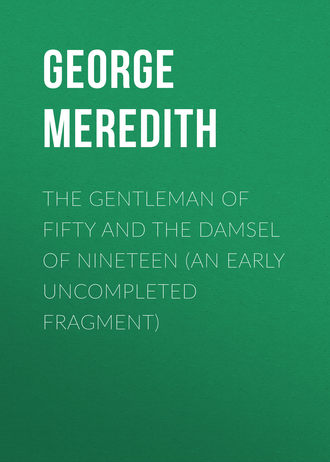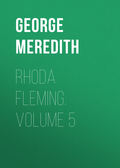
George Meredith
The Gentleman of Fifty and The Damsel of Nineteen (An early uncompleted fragment)
Her speech has become occasionally French in the construction of the sentences.
'Mais oui,' I said shyly, and being alone with her, I was not rebuffed by her smile, especially as she encouraged me on.
I am, she told me, to see a monde of French people here in September. So, the story of me is to be completer, or continued in September. I could not get Miss Pollingray to tell me distinctly whether Madame la Marquise will be one of the guests. But I know that she is not a widow. In that case, she has a husband. In that case, what is the story of her relations towards Mr. Pollingray? There must be some story. He would not surely have so many portraits of her about the house (and they travel with him wherever he goes) if she were but a lovely face to him. I cannot understand it. They were frequent, constant visitors to one another's estates in France; always together. Perhaps a man of Mr. Pollingray's age, or perhaps M. le Marquis—and here I lose myself. French habits are so different from ours. One thing I am certain of: no charge can be brought against my Englishman. I read perfect rectitude in his face. I would cast anchor by him. He must have had a dreadful unhappiness.
Mama kept her promise by sending my riding habit and hat punctually, but I had run far ahead of all the wishes I had formed when I left home, and I half feared my ride out with Mr. Pollingray. That was before I had received Charles's letter, letting me know the object of my invitation here. I require at times a morbid pride to keep me up to the work. I suppose I rode befittingly, for Mr. Pollingray praised my seat on horseback. I know I can ride, or feel the 'blast of a horse like my own' —as he calls it. Yet he never could have had a duller companion. My conversation was all yes and no, as if it went on a pair of crutches like a miserable cripple. I was humiliated and vexed. All the while I was trying to lead up to the French lady, and I could not commence with a single question. He appears to, have really cancelled the past in every respect save his calling me his goddaughter. His talk was of the English poor, and vegetation, and papa's goodness to his old dames in Ickleworth parish, and defects in my education acknowledged by me, but not likely to restore me in my depressed state. The ride was beautiful. We went the length of a twelve-mile ridge between Ickleworth and Hillford, over high commons, with immense views on both sides, and through beech-woods, oakwoods, and furzy dells and downs spotted with juniper and yewtrees— old picnic haunts of mine, but Mr. Pollingray's fresh delight in the landscape made them seem new and strange. Home through the valley.
The next day Miss Pollingray joined us, wearing a feutre gris and green plume, which looked exceedingly odd until you became accustomed to it. Her hair has decided gray streaks, and that, and the Queen Elizabeth nose, and the feutre gris!—but she is so kind, I could not even smile in my heart. It is singular that Mr. Pollingray, who's but three years her junior, should look at least twenty years younger—at the very least. His moustache and beard are of the colour of a corn sheaf, and his blue eyes shining over them remind me of summer. That describes him. He is summer, and has not fallen into his autumn yet. Miss Pollingray helped me to talk a little. She tried to check her brother's enthusiasm for our scenery, and extolled the French paysage. He laughed at her, for when they were in France it was she who used to say, 'There is nothing here like England!' Miss Fool rode between them attentive to the jingling of the bells in her cap: 'Yes' and 'No' at anybody's command, in and out of season.
Thank you, Charles, for your letter! I was beginning to think my invitation to Dayton inexplicable, when that letter arrived. I cannot but deem it an unworthy baseness to entrap a girl to study her without a warning to her. I went up to my room after I had read it, and wrote in reply till the breakfast-bell rang. I resumed my occupation an hour later, and wrote till one o'clock. In all, fifteen pages of writing, which I carefully folded and addressed to Charles; sealed the envelope, stamped it, and destroyed it. I went to bed. 'No, I won't ride out to- day, I have a headache!' I repeated this about half-a-dozen times to nobody's knocking on the door, and when at last somebody knocked I tried to repeat it once, but having the message that Mr. Pollingray particularly wished to have my company in a ride, I rose submissively and cried. This humiliation made my temper ferocious. Mr. Pollingray observed my face, and put it down in his notebook. 'A savage disposition,' or, no, 'An untamed little rebel'; for he has hopes of me. He had the cruelty to say so.
'What I am, I shall remain,' said I.
He informed me that it was perfectly natural for me to think it; and on my replying that persons ought to know themselves best: 'At my age, perhaps,' he said, and added, 'I cannot speak very confidently of my knowledge of myself.'
'Then you make us out to be nothing better than puppets, Mr. Pollingray.'
'If we have missed an early apprenticeship to the habit of self-command, ma filleule.'
'Merci, mon parrain.'
He laughed. My French, I suppose.
I determined that, if he wanted to study me, I would help him.
'I can command myself when I choose, but it is only when I choose.'
This seemed to me quite a reasonable speech, until I found him looking for something to follow, in explanation, and on coming to sift my meaning, I saw that it was temper, and getting more angry, continued:
'The sort of young people who have such wonderful command of themselves are not the pleasantest.'
'No,' he said; 'they disappoint us. We expect folly from the young.'
I shut my lips. Prince Leboo knew that he must go, and a good gallop reconciled me to circumstances. Then I was put to jumping little furzes and ditches, which one cannot pretend to do without a fair appearance of gaiety; for, while you are running the risk of a tumble, you are compelled to look cheerful and gay, at least, I am. To fall frowning will never do. I had no fall. My gallant Leboo made my heart leap with love of him, though mill-stones were tied to it. I may be vexed when I begin, but I soon ride out a bad temper. And he is mine! I am certainly inconstant to Charles, for I think of Leboo fifty times more. Besides, there is no engagement as yet between Charles and me. I have first to be approved worthy by Mr. and Miss Pollingray: two pairs of eyes and ears, over which I see a solemnly downy owl sitting, conning their reports of me. It is a very unkind ordeal to subject any inexperienced young woman to. It was harshly conceived and it is being remorselessly executed. I would complain more loudly—in shrieks—if I could say I was unhappy; but every night I look out of my window before going to bed and see the long falls of the infant river through the meadow, and the dark woods seeming to enclose the house from harm: I dream of the old inhabitant, his ancestors, and the numbers and numbers of springs when the wildflowers have flourished in those woods and the nightingales have sung there. And I feel there will never be a home to me like Dayton.
CHAPTER V
HE
For twenty years of my life I have embraced the phantom of the fairest woman that ever drew breath. I have submitted to her whims, I have worshipped her feet, I have, I believe, strengthened her principle. I have done all in my devotion but adopt her religious faith. And I have, as I trusted some time since, awakened to perceive that those twenty years were a period of mere sentimental pastime, perfectly useless, fruitless, unless, as is possible, it has saved me from other follies. But it was a folly in itself. Can one's nature be too stedfast? The question whether a spice of frivolousness may not be a safeguard has often risen before me. The truth, I must learn to think, is, that my mental power is not the match for my ideal or sentimental apprehension and native tenacity of attachment. I have fallen into one of the pits of a well-meaning but idle man. The world discredits the existence of pure platonism in love. I myself can barely look back on those twenty years of amatory servility with a full comprehension of the part I have been playing in them. And yet I would not willingly forfeit the exalted admiration of Louise for my constancy: as little willingly as I would have imperilled her purity. I cling to the past as to something in which I have deserved well, though I am scarcely satisfied with it. According to our English notions I know my name. English notions, however, are not to be accepted in all matters, any more than the flat declaration of a fact will develop it in alt its bearings. When our English society shall have advanced to a high civilization, it will be less expansive in denouncing the higher stupidities. Among us, much of the social judgement of Bodge upon the relations of men to women is the stereotyped opinion of the land. There is the dictum here for a man who adores a woman who is possessed by a husband. If he has long adored her, and known himself to be preferred by her in innocency of heart; if he has solved the problem of being her bosom's lord, without basely seeking to degrade her to being his mistress; the epithets to characterise him in our vernacular will probably be all the less flattering. Politically we are the most self-conscious people upon earth, and socially the frankest animals. The terrorism of our social laws is eminently serviceable, for without it such frank animals as we are might run into bad excesses. I judge rather by the abstract evidence than by the examples our fair matrons give to astounded foreigners when abroad.
Louise writes that her husband is paralysed. The Marquis de Mazardouin is at last tasting of his mortality. I bear in mind the day when he married her. She says that he has taken to priestly counsel, and, like a woman, she praises him for that. It is the one thing which I have not done to please her. She anticipates his decease. Should she be free— what then? My heart does not beat the faster for the thought. There are twenty years upon it, and they make a great load. But I have a desire that she should come over to us. The old folly might rescue me from the new one. Not that I am any further persecuted by the dread that I am in imminent danger here. I have established a proper mastery over my young lady. 'Nous avons change de role'. Alice is subdued; she laughs feebly, is becoming conscious—a fact to be regretted, if I desired to check the creature's growth. There is vast capacity in the girl. She has plainly not centred her affections upon Charles, so that a man's conscience might be at ease if—if he chose to disregard what is due to decency. But, why, when I contest it, do I bow to the world's opinion concerning disparity of years between husband and wife? I know innumerable cases of an old husband making a young wife happy. My friend, Dr. Galliot, married his ward, and he had the best wife of any man of my acquaintance. She has been publishing his learned manuscripts ever since his death. That is an extreme case, for he was forty-five years her senior, and stood bald at the altar. Old General Althorpe married Julia Dahoop, and, but for his preposterous jealousy of her, might be cited in proof that the ordinary reckonings are not to be a yoke on the neck of one who earnestly seeks to spouse a fitting mate, though late in life. But, what are fifty years? They mark the prime of a healthy man's existence. He has by that time seen the world, can decide, and settle, and is virtually more eligible—to use the cant phrase of gossips—than a young man, even for a young girl. And may not some fair and fresh reward be justly claimed as the crown of a virtuous career?
I say all this, yet my real feeling is as if I were bald as Dr. Galliot and jealous as General Althorpe. For, with my thorough knowledge of myself, I, were I like either one of them, should not have offered myself to the mercy of a young woman, or of the world. Nor, as I am and know myself to be, would I offer myself to the mercy of Alice Amble. When my filleule first drove into Dayton she had some singularly audacious ideas of her own. Those vivid young feminine perceptions and untamed imaginations are desperate things to encounter. There is nothing beyond their reach. Our safety from them lies in the fact that they are always seeing too much, and imagining too wildly; so that, with a little help from us, they may be taught to distrust themselves; and when they have once distrusted themselves, we need not afterwards fear them: their supernatural vitality has vanished. I fancy my pretty Alice to be in this state now. She leaves us to-morrow. In the autumn we shall have her with us again, and Louise will scan her compassionately. I desire that they should meet. It will be hardly fair to the English girl, but, if I stand in the gap between them, I shall summon up no small quantity of dormant compatriotic feeling. The contemplation of the contrast, too, may save me from both: like the logic ass with the two trusses of hay on either side of him.







